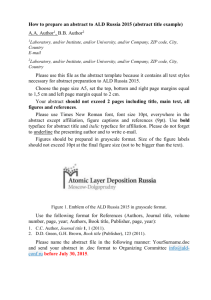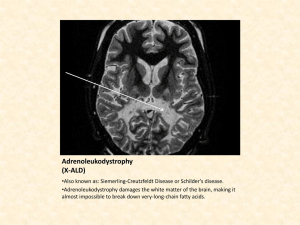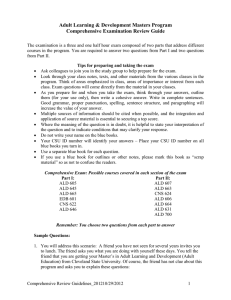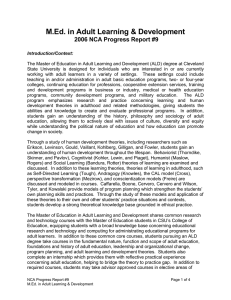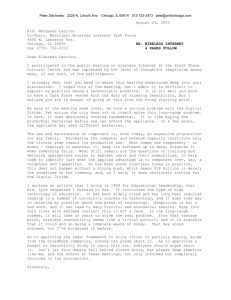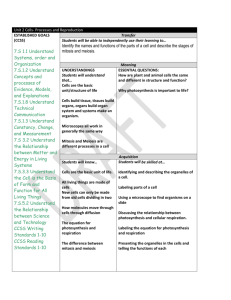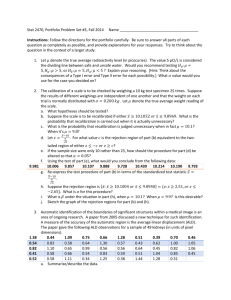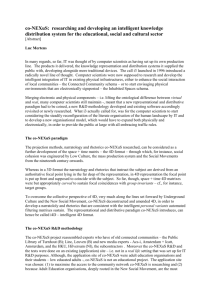M.Ed. in Adult Learning & Development 2005 NCA Progress Report #8
advertisement
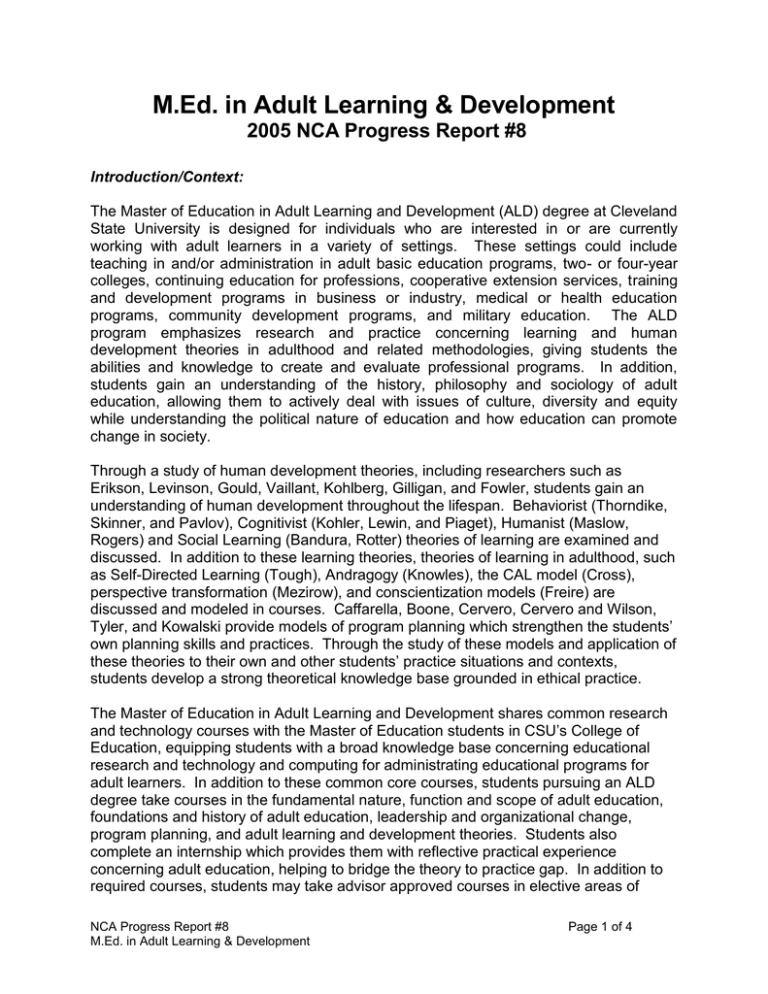
M.Ed. in Adult Learning & Development 2005 NCA Progress Report #8 Introduction/Context: The Master of Education in Adult Learning and Development (ALD) degree at Cleveland State University is designed for individuals who are interested in or are currently working with adult learners in a variety of settings. These settings could include teaching in and/or administration in adult basic education programs, two- or four-year colleges, continuing education for professions, cooperative extension services, training and development programs in business or industry, medical or health education programs, community development programs, and military education. The ALD program emphasizes research and practice concerning learning and human development theories in adulthood and related methodologies, giving students the abilities and knowledge to create and evaluate professional programs. In addition, students gain an understanding of the history, philosophy and sociology of adult education, allowing them to actively deal with issues of culture, diversity and equity while understanding the political nature of education and how education can promote change in society. Through a study of human development theories, including researchers such as Erikson, Levinson, Gould, Vaillant, Kohlberg, Gilligan, and Fowler, students gain an understanding of human development throughout the lifespan. Behaviorist (Thorndike, Skinner, and Pavlov), Cognitivist (Kohler, Lewin, and Piaget), Humanist (Maslow, Rogers) and Social Learning (Bandura, Rotter) theories of learning are examined and discussed. In addition to these learning theories, theories of learning in adulthood, such as Self-Directed Learning (Tough), Andragogy (Knowles), the CAL model (Cross), perspective transformation (Mezirow), and conscientization models (Freire) are discussed and modeled in courses. Caffarella, Boone, Cervero, Cervero and Wilson, Tyler, and Kowalski provide models of program planning which strengthen the students’ own planning skills and practices. Through the study of these models and application of these theories to their own and other students’ practice situations and contexts, students develop a strong theoretical knowledge base grounded in ethical practice. The Master of Education in Adult Learning and Development shares common research and technology courses with the Master of Education students in CSU’s College of Education, equipping students with a broad knowledge base concerning educational research and technology and computing for administrating educational programs for adult learners. In addition to these common core courses, students pursuing an ALD degree take courses in the fundamental nature, function and scope of adult education, foundations and history of adult education, leadership and organizational change, program planning, and adult learning and development theories. Students also complete an internship which provides them with reflective practical experience concerning adult education, helping to bridge the theory to practice gap. In addition to required courses, students may take advisor approved courses in elective areas of NCA Progress Report #8 M.Ed. in Adult Learning & Development Page 1 of 4 study to further enhance their subject matter expertise or their current employment status within the field of adult education. In summation, the ALD program provides present and future adult educators with theories, skills, knowledge and abilities, enabling them to plan programs for a diverse population of adult learners in a variety of settings, including technical/vocational colleges, proprietary schools, four-year colleges, and business and industry staff development or human resource development programs. The ALD program at CSU has experienced rapid growth in the past four years and has almost tripled in student size. While the rapid growth has been good for the program, it has created problems staffing courses; the program currently has three full-time faculty members serving approximately 300 degree and certificate seeking graduate students. Program Goals: Learning is a lifelong process that extends far beyond formal schooling. Adult education facilitates and enhances this process, helping men and women realize their potential as responsible and productive citizens, workers, and family members. Today’s adult educator must possess vision, theory and practical skills to promote active learning and reflection among a diverse population of adult learners. The ALD Program at Cleveland State University is committed to providing present and future adult educators with: 1. A cognizance of the issues and problems confronting adult educators in a variety of learning environments and the diversity of the adult learner population, 2. An understanding of the theories, philosophies, history and practices concerning adult education, adult learning theories, and adult developmental psychology and how to apply these theories to practice, 3. Knowledge and application of program planning, organizational change, and leadership concepts for planning and leading programs for adult learners. These goals were articulated by faculty members in section meetings during the course of the school year 2004-2005. They have been refined into their present form by the ALD section coordinator. Outcomes: Related program outcomes are contained in the table that can be found at the conclusion of this report. These outcomes have not been altered since the NCA Assessment Plan for the ALD program was developed by section faculty. Research: Direct evidence of the above outcomes was collected from reviewing roster/grade sheets from past semesters. Comprehensive examination evidence was obtained from the Educational Student Services Center in the College of Education & Human Services at NCA Progress Report #8 M.Ed. in Adult Learning & Development Page 2 of 4 Cleveland State University. Indirect evidence concerning program effectiveness has been gathered by the three faculty members who teach in the program through advising sessions with students, faculty-developed survey forms, and in-class discussions with students. Findings: Data were analyzed by faculty members during monthly section meetings. Results for outcomes listed above have been found to be consistent with previous years findings; however, program growth is clearly evident when “N” is examined from prior year’ s reports. “N” size has approximately tripled from the prior year’s report, a clear indication of strong program growth. Review: Two ALD faculty members have secured a grant for assessment of graduates and are developing a program assessment survey, which will be sent to program graduates in the summer of 2005. The purpose of the survey is to assess the effectiveness of the program in order to plan future program and course development. When the results of this survey are examined, faculty members will discuss the findings at monthly section meetings to plan for new program and course developments. Actions: As a result of formal and informal surveys of previous year ALD students, ALD faculty members are developing the requirements for a portfolio exit option for the master’s program. Students have indicated that they would like this as a viable exit option for the ALD program. A portfolio course for students who choose this option has already been developed, approved by the graduate college, and is in the graduate catalog. Although the course was approved, it has not been offered due to the unavailability of full-time faculty members to teach it. Since a third ALD faculty member has been added this past school year (04-05), the ALD program faculty plan to offer this course starting in Fall Semester of 2006. Rubrics for the portfolio are currently under development by ALD faculty members NCA Progress Report #8 M.Ed. in Adult Learning & Development Page 3 of 4 NORTH CENTRAL ASSOCIATION STUDENT ASSESSMENT PLAN 2005 College of Education and Human Services Status Report #8 Program: M.Ed. Adult Learning & Development OUTCOMES TARGETS & ASSESSMENT MEASURES N RESULTS REVIEW, ACTIONS & IMPROVEMENTS #1 - Graduates will demonstrate skills in completing projects/assignments in field settings. At least 90% of students will complete activities identified in adult learning and development practicum course (ALD 688) with grade of "B" or better using individual faculty developed scoring rubrics. 38 99% received B or better. No action required #2 - Graduates will demonstrate knowledge and understanding of program content in meeting exit requirement. Pass rate should be 90% or better on comprehensive exams. Theses and projects will be completed in less than one year. 40 95% passed No action required 4 Projects completed Comprehensive exam primer is a component of the internship class (a required course) and helps prepare students for the exam #4 - Students will demonstrate aptitude for understanding and using knowledge of social and educational issues as applied to adults. 100% of students will complete ALD 605 or 607 with a grade of “B” or better using individual faculty developed scoring rubrics. 124 100% had grade of B or better (74 in ALD 605 and 50 in ALD 607). No action required NCA Progress Report #8 M.Ed. in Adult Learning & Development Page 4 of 4
